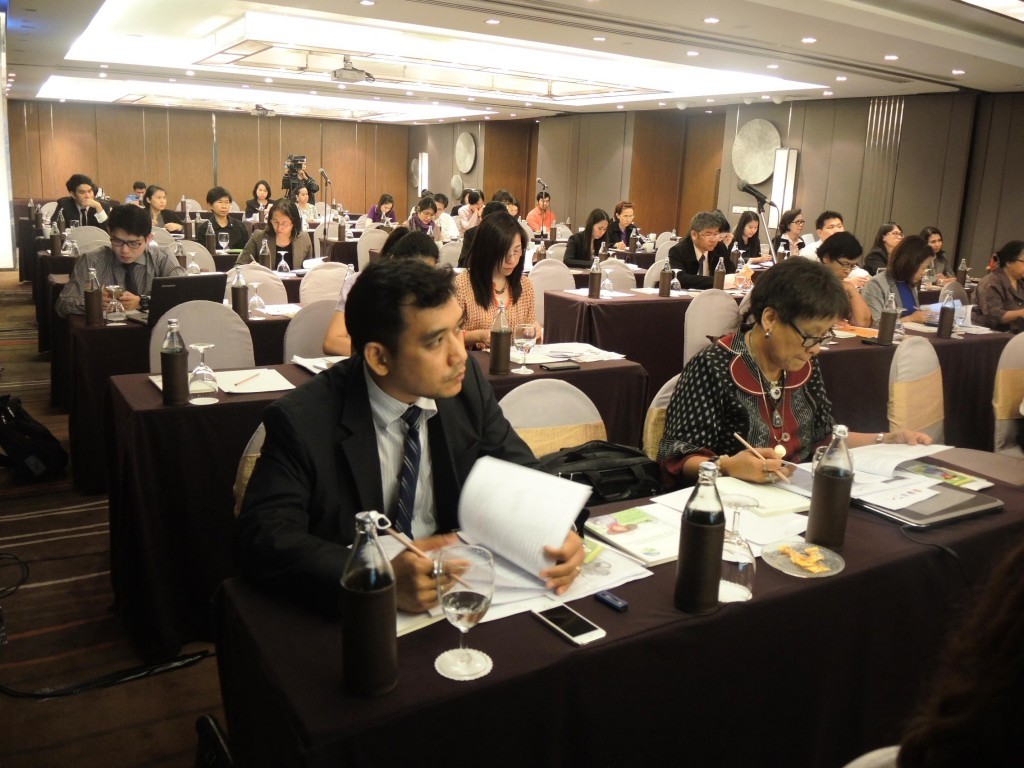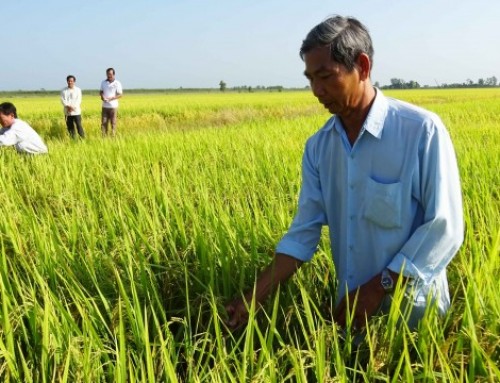Thailand’s 1st Policy Dialogue on Food and Nutrition Security calls for stronger cooperation mechanisms

by Lisa Faust
Most of the 805 million people who do not have enough to eat in the world, live in countries that have food surpluses rather than deficits. Thailand – the world’s leading exporter of rice and fruits and referred to as the “Kitchen of the World” – too suffers from this paradox. The underlying reason behind why 6.8 percent (FAO, 2014) of the Thai population is considered undernourished is thus not a lack of food availability, but rather insufficient access to food.

From left: Mr. David Oberhuber, Country Director, GIZ Thailand; Ms. Jantida Meedech, Office of Agricultural Economics; Ms. Bangjongjit Angsusingh, Department of Foreign Trade Ministry of Commerce; Dr. Apichart Pongsrihadulchai, Ministry of Agriculture and Cooperatives; Dr. Surmsuk Salakpetch, Department of Agriculture; Mr. Chaisiri Mahantachaisakul, National Bureau of Agricultural Commodity and Food Standards; and Dr. Rangsit Poosiripinyo, Office of Agricultural Economics
This challenge is particularly prevalent in many remote areas and has been exacerbated by a steady increase in food prices and production costs throughout the past decade. Other major obstacles to ensuring food security in Thailand include insufficient nutrition, poverty, climate change, an ageing farmer’s population coupled with their deteriorating health, and inadequate soil and water management.
These issues were raised and discussed at Thailand’s first ‘Policy Dialogue on Food and Nutrition Security and the ASEAN Integrated Food Security (AIFS) Framework in Thailand’, which was organized in Bangkok on 31 March 2015, by the ASEAN Sustainable Agrifood Systems (SAS) project. Commissioned by the German Federal Ministry for Economic Cooperation and Development, the SAS project aims to enable ASEAN Member States in implementing the ASEAN Integrated Food Security (AIFS) Framework, and its Strategic Plan of Action on Food Security (SPA-FS) at national level.
To ensure long-term food and nutrition security, as well as improve the livelihoods of farmers across the entire ASEAN region, the ASEAN Integrated Food Security (AIFS) Framework was adopted by the Member states at the 14th ASEAN Summit in 2009 to provide scope and joint pragmatic approaches for cooperation among ASEAN Member States. The ASEAN leaders reiterated the importance to develop a common and unified position to ensure sustainable food security and nutrition in ASEAN and endorsed the new phase of AIFS Framework and SPA-FS, 2015-2020 at the 25th ASEAN Summit held in November 2014 in Nay Pyi Taw, Myanmar.
With over 60 participants from various agencies and ministries in Thailand, including high level policy makers from relevant Ministries, the Policy Dialogue provided a platform for exchange of information and to build consensus on policies and strategies for tackling food insecurity within Thailand collectively.
The government of Thailand has given priority to food security as highlighted in the Eleventh National Economic and Social Development Plan (2012-2016), which provided a Strategy for Strengthening the Agricultural Sector, Food and Energy Security. The importance of food security is as well emphasized in the Strategic Framework for Food Security of the Ministry of Agriculture and Cooperatives (2013-2016) to promote sustainable food production and access to quality and nutritious food,
said Dr. Apichart Pongsrihadulchai, Vice Minister of Agriculture and Cooperatives, during his keynote speech at the Policy Dialogue.
There was census among participants in the following: Firstly, the need to revise the mechanisms of the existing food security Frameworks in Thailand and their implementation. Clear roles and responsibilities have to be assigned to the relevant ministries, private sector and other actors, in order ensure a better understanding among every stakeholder involved. Secondly, as effective implementation of technical solutions is often hindered by limited collaboration between stakeholders, participants call for a concrete cooperation mechanism that facilitates and mandates coordination between the private and public sector. Thirdly, at the ASEAN level, improved cooperation and communication is necessary between the different ASEAN Ministers of Agriculture and Forestry reporting food security bodies and parallel initiatives. This will enable a more fluid sharing and exchange of information, lessons learnt and experiences between the ASEAN Member States.
“Agriculture is a key sector in terms of social and economic development for Thailand. Though Thailand is considered an advanced country in terms of food security, however, issues and challenges still remain and require collaboration and coordination among relevant ministries, private sector and stakeholders in addressing the issues,”
said Mr. David Oberhuber, Country Director of GIZ Thailand, in his speech at the Policy Dialogue.
To follow-up on the outcomes of this Policy Dialogue, SAS project will organise a second Policy Dialogue on Food and Nutrition Security in early 2017. It is hoped that these Policy Dialogues can contribute towards Thailand’s progress in creating food production systems that incorporate economic, social and environmental dimensions, and eliminate poverty and hunger across the nation.






